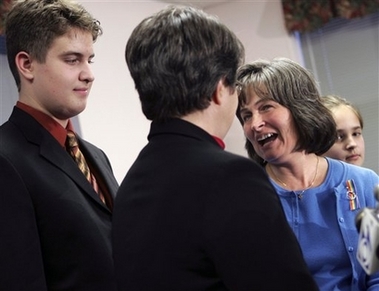New Jersey court opens door to gay marriage
(AP)
Updated: 2006-10-26 06:49
TRENTON, N.J. - New Jersey's highest court opened the door Wednesday to
making the state the second in the nation to allow gay marriage, ruling that
lawmakers must offer homosexuals either marriage or something like it, such as
civil unions.
In a ruling that fell short of what either side wanted or feared, the state
Supreme Court declared 4-3 that homosexual couples are entitled to the same
rights as heterosexual ones. The justices gave lawmakers 180 days to rewrite the
laws.
|

Maureen Kilian, center right, reacts as her partner, Cindy
Meneghin, center left, asks to marry her during a news conference
regarding a New Jersey Supreme Court ruling on gay marriage in the state
in Newark, N.J., Wednesday, Oct. 25, 2006. [AP]
|
The ruling is similar to the 1999 high-court ruling in Vermont that led the
state to create civil unions, which confer all of the rights and benefits
available to married couples under state law.
"Although we cannot find that a fundamental right to same-sex marriage exists
in this state, the unequal dispensation of rights and benefits to committed
same-sex partners can no longer be tolerated under our state Constitution,"
Justice Barry T. Albin wrote for the four-member majority.
The court said the Legislature "must either amend the marriage statutes to
include same-sex couples or create a parallel statutory structure" that gives
gays all the privileges and obligations married couples have.
The three dissenters argued that the majority did not go far enough. They
demanded full marriage for gays.
Gay rights activists had seen New Jersey as a promising place because it is a
largely Democratic state in the Northeast. The only state to allow gay marriage
is Massachusetts. The only states allowing civil unions are Vermont and
Connecticut. New Jersey is also one of just five states that have no law or
constitutional amendment expressly banning gay marriage.
If the court had legalized gay marriage outright, the effect could have been
more far-reaching, and New Jersey could have become more of a magnet for gay
couples than Massachusetts, which has a law barring out-of-state couples from
marrying there if their marriages would not be recognized in their home states.
New Jersey has no such law.
A clear-cut ruling legalizing gay marriage this close to Election Day could
also have been a political bombshell, galvanizing Republicans and the religious
right. Eight states have gay marriage bans on their ballots in November.
New Jersey Republicans, who are in the minority in the Legislature, said they
would work to ban same-sex unions by enacting a constitutional amendment.
| 1 | 2 |  |
|